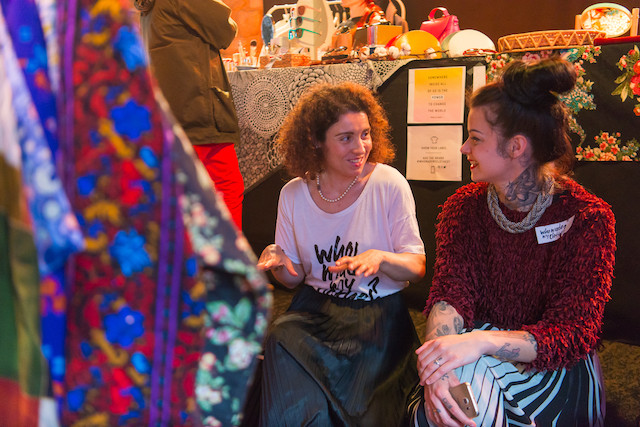Stylianee Parascha and Mandy Patrick participated in the first edition of the Luxembourg-Poland business club entrepreneurial women programme.
“From the time I went to the first meeting to now, I’m a totally different person,” Parascha tells Delano five years on. “At that time, I was very reserved.” Speaking in front of large crowds did not come naturally to Parascha but with the new spring in her step that starting a business brings, she worked at it, even presenting her upcycling clothing business at the Ideas from Europe pitch at Technoport. “I’m now more comfortable though it’s not my favourite thing,” she admits.
There were other hurdles to follow. Parascha says her first major learning curve came when she realised her business plan, creating new items from unsold inventory from fashion brands, was problematic. “I found it wasn’t so easily doable. There were difficulties in getting that inventory and telling them I wouldn’t mention their brand,” she says. She found a solution--designing and making clothes made from sustainable materials.
Parascha quit her job to develop her her business in September 2015 and launched her first collection under the brand “What.Eve.Wears” in February 2016. She relished the time spent in her native Greece developing her designs. “This is the part I liked the most. Then, when you have to sell what you create, I think it becomes more difficult.”
Parascha returned to paid employment in November 2017, since when she has continued working on the brand in her free time. “It was purely for financial reasons. I’m not the kind of person who can say ‘money will be tight’. It’s expensive here,” she remembers.
Like a true entrepreneur, Parascha has no plans to give up what she has started. She would like to find a business partner who can support her on the selling side, but even if she doesn’t, she is exploring other avenues. She continues to organise awareness-raising events around sustainable fashion like the Fashion Revolution. She writes about ethical fashion and fashion tech and is considering branching out to advise businesses about sustainability. “I’m even thinking I should relocate to Berlin,” she says, adding: “The ones who succeed persevere.”
“Presentations are still outside my comfort zone”
Mandy Patrick witnessed a similar transformation from the early days when a shy and reserved group gathered for the weekend trainings. “I’m a little less shy about turning up when we are networking, speaking to people and being involved,” she says.

Photo: Red Squirrel. Mandy Patrick, pictured, set up Red Squirrel and provides administrative support for other startups
While she says that public speaking remains outside of her “comfort zone”, you will still see her stand up and present because it’s part of the job.
The British national had established office administrative support firm Red Squirrel a few months before starting the course. A self-confessed “admin geek”, she has gone from one client to working with around 70 in the past five years and two years ago took on a member of staff, her daughter.
She says that one of the main things she learned in the process was to sharpen her radar to avoid personality clashes with clients. “Initially, when you start, you say ‘yes’ to everyone who wants to be a client. Now we have the luxury of being able to say ‘no’ if you don’t feel it’s right.” Patrick says she is constantly learning, mostly to stay ahead of new laws or major regulations like GDPR.
And, while she says she still has weaknesses, in areas like marketing, the network she built in those early days of getting out into the startup community has been as important in generating business as her website, if not more. “The majority of our business is through referrals,” she says.
Perhaps the best benchmark of what she’s learned is that five years later, Patrick is now on the other side of the training room, sharing her know-how with other women entrepreneurs in Luxembourg as a speed mentor and working on panels for Amcham and the Polish business chamber.
